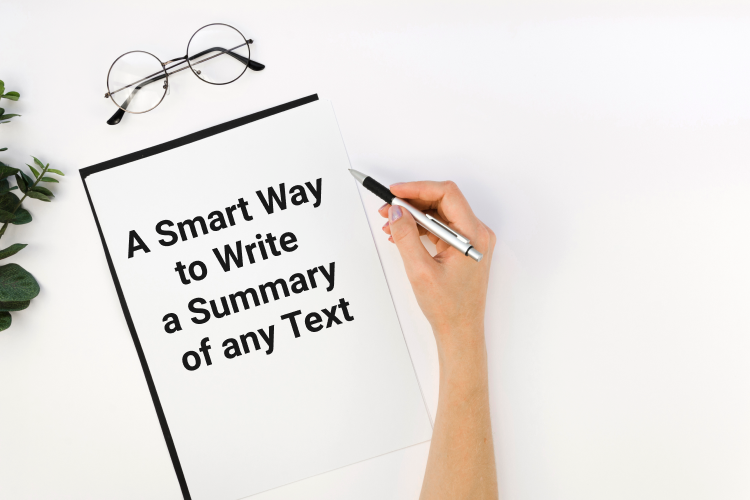A Smart Way to Write a Summary of any Text

A summary is a brief statement of the main ideas and the most important points of a text in own words. The task to write a summary is one of the most often tasks that a student faces in college. It is a common exercise in classes, it is an inevitable part of the preparation for any academic paper, and it is an excellent method in the learning process in general. When you need to absorb a lot of information, summarizing will help you greatly because the main purpose of the summary is to get the point.
When Do You Need to Write a Summary?
If we stress the word “write”, then the circumstances will be most likely connected with your studies.
Also Read: Useful Tips on How To Write a Happiness Essay
- Teachers assign the task to write a summary of some text to the students to perform at the classes or as a part of homework very often. It has to show how well you’ve understood the learning material or any other text.
- You need to do this yourself in the process of preparation for academic papers like essays. To prepare arguments for a dispute or an essay – you have to find and absorb a lot of information on a certain topic, but you can’t include everything into a limited volume of the text. Besides, you should not retell in the information you found, you need to give the essentials and your understanding of the materials.
- Writing a summary has a lot to do with learning the rules of quotation. There are definite regulations that determine how you give credits to the sources you obtain the information from. It is a required step, as a presentation of someone else’s words and ideas without mentioning the author is plagiarism. This way you can kill two birds with one stone: write a proper summary for your needs and learn these extremely important for any scientific work tips on the citation.
- Eventually, you may write a summary to train your memory and cognitive skills, especially when you examine a new topic or learn a new language.
All in all, you need a summary any time you have to condense much data into a smaller form. Brief notes are much easier to understand and remember. For instance, it will be a great support when you will get prepared for exams.
What Should You Write in a Summary?
Many helpful articles and guides on writing academic papers for students constantly claim that you need to summarize ideas or some data for this or that part of your text. However, they mostly don’t clarify how exactly you are to write a summary. What elements should it include, how long should it be, etc.
Let’s clarify these vague things.
Also Read: Guide To Writing a Winning Argumentative Essay
How long the summary should be?
There are no strict requirements for the length of the text of a summary. If it is a college task, then your tutor will probably specify how large your text must be. If you compose a summary for yourself during the process of learning new material or revising some information, it will be up to you to decide.
In most cases, the size of the summary depends on the size of the source which you need to summarize. On average it takes approximately one-third of the original text.
Which criteria a good summary should meet?
A summary you need to prepare for a class assessment includes several benchmarks that you have to check and make sure you cover them all:
- The summary of a text must be a kind of a substitute for the original full text. You should be able to refer to the summary to refresh the necessary information in your memory and get all the necessary points without reading through the original text. If you write a summary for the class assessment, then your audience should understand the original text from the brief retelling you provide. That’s why you must provide the accurate retelling of the original and not your interpretation.
- The text of the summary must be in your words, but you must not add your judgment or opinions. The summary is to put full data of the original text into a smaller form, nothing more. You may further add your comments to the summary or use the summarized statements to support your ideas, but you should not mix them in one item.
- Your summarized text must cover the main idea or ideas of the original text and expose them.
- The summary should include and explain the most important statements and arguments of the original text. The explanation should be brief, but it must be concise. Note that you should include both the supportive and disproving evidence.
- Secondary facts, details, and digressions are not needed in a summary.
- The summary must be about three times shorter than the original text. Orient the work towards this value if you write a summary of some articles or a speech.
- Pay attention to the direct citations if you find it necessary to include them in your text. Keep yourself from taking many quotes, refer to the one if only you want to illustrate the idea by the author’s choice of words. Be very careful about citing and assure giving all credits to the sources.
What is the main idea of the original text?
As providing the main ideas of the source text is obligatory in a summary, you need to define those ideas at first. This is how to do this:
- Read the text you have to summarize very attentively, and you may need doing that several times. The task is to find out what the text is about and what it tries to imply. Write down your thought about that. It is OK if you change your mind or find some new connotations when you re-read that text, as the ideas might be not so obvious.
- Explore the title is the text has it. The title should include at least one of the most important ideas or help the audience to apprehend it.
- Consider the circumstances of that original text creation. Where and when was it published? This will help you to grasp the context. What was the target audience of that text? In such a way you find out which events and thoughts were important for them and what the author wanted to persuade them.
How to define the main arguments?
To find the arguments to mention them in the summary, you should refer to the text structure. Most original texts you will deal with in colleges have the logical structure, and their parts would introduce those arguments for the ideas.
- Create a basic outline of the text. It is easier to grasp the information when it is well-structured, and you can divide it into meaningful parts.
- Mark those areas and concepts that you would like to mention in your summary.
- Formulate the main concepts described in each paragraph. If the author has already composed the sentence that defines the idea – great. Write it down separately.
- Paraphrase these sentences – refer to the reported speech, shorten the longer constructions, etc. You should not use the same means as the original work, otherwise, it will turn your summary into a set of quotes.
- Get rid of all unimportant facts and details. Leave the main concepts and their supportive evidence only.
Write a Summary of the Text
When you are well-prepared for the task and have found the main ideas and the supportive and disproving arguments, you can write a summary of any text.
Compose the Introduction part. You have already dealt with this item in the essay, and it is also needed in summary. At the very beginning of your work name the author – give the first and last name – and the title of the original work you are summarizing. Define the type of the original work – it can be an article, a speech, an essay, or any other form of writing. After that, name the main ideas of the text you’ve selected.
The Body part of the summary will include the arguments and examples from the source text. Assure that you include the meaningful fragments only, and not minor details. Note that you need to write in own words and turn the direct fragments from the original work to reported speech.
Check the inner logic of your text ad make sure that all statements are clear, and the arguments are connected with them. Also, compose and insert transition phrases to lead the audience from one idea to the next one smoothly.
Unlike the traditional essay, a summary does not require having a conclusion. You can just finish your restatement of the original text, and that will be all. You may include the Conclusion part if it is a part of the assigned task. Or, if you have created a great Conclusion part in your mind and want to share it with the audience.
Important tips for writing a summary
- You should always use the present tense in the summary even if you retell the past events and the authors are long gone.
- Make sure that you understand every detail in the original work. Check the meaning of any doubtful terms or phrases and analyze the logical connections to not produce an incorrect interpretation.
- Consider the choice of words. Your vocabulary must serve to make the summary clear, but you also can create a certain tone of the narrative. For example, you use the neutral “says” or the stronger “insists”, and this will produce a different impression on the audience. Note your verbs and adverbs, as they are the most powerful means.
What are the correct citation principles for a summary?
Like is already mentioned, you need to give credit to the authors. It is important to mark the sources you used, as you have to present the summary of some other text and not your ideas. Thus, follow these rules:
- The full name – first name and last name – must be set for the first reference. Further in the text, you use the author’s last name only.
- If the author has a title like an academic degree or simple Mr. or Mrs., it is not required to mention those titles. Though you can do it to prove their authority: if you summarize some scientific work, it would be helpful to include constructions like “Prof. Smith claims that…” or “Doctor Williams stands up against that…”
- You can replace the names and titles of the author with pronouns “he” or “she”, when you summarize a piece of text and need to mention the same author several times in that piece.
When you complete your summary, take your time and let your mind be refreshed. The best way is to give yourself some rest for at least a couple of hours without the text you worked on. Then get back to it, re-read it and revise. You may define mistakes or awkward phrases to fix. It is great if you can give your summary to someone to beta-read it and provide the feedback.
This way you can write a summary of any text, no matter how large and sophisticated it looks.
Get more info from our insights!
At Paytowritepaper, our main objective is to provide a high-quality assistance for academic assignment of any complexity. Except of writing help, we also share guides to different tasks and other information about student's lifestyles. Check the recommendations and reach our writers if you need any kind of writing assistance!
Get started




